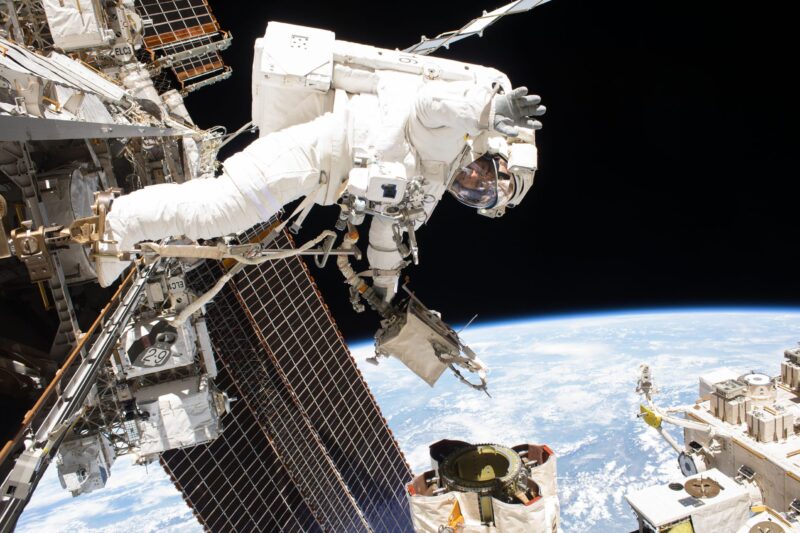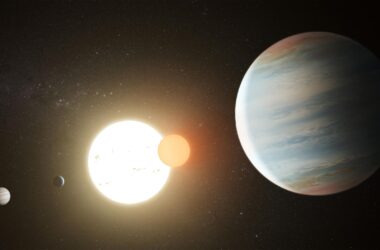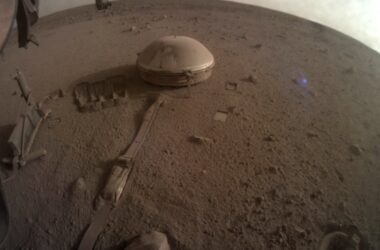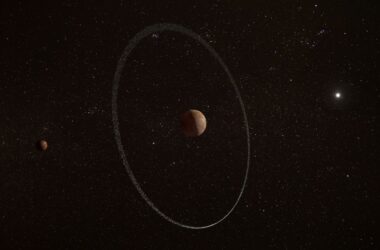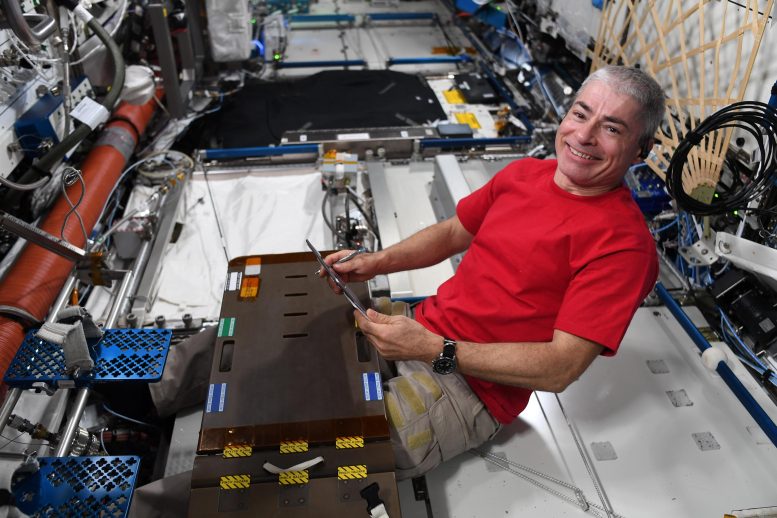
À bord de la Station spatiale internationale, l’astronaute de la NASA Mark Vande Hei prend le temps de se détendre avec un livre. Vande Hei est entré dans le livre des records le mardi 15 mars 2022, battant le record du plus grand nombre de jours consécutifs dans l’espace pour un explorateur américain. Crédit : NASA/ESA/T. Pesquet
Vande Hei est entré dans le livre des records le mardi 15 mars 2022 : il a battu le record du plus grand nombre de jours consécutifs passés dans l’espace par un explorateur américain.
Vande Hei est arrivé à la station spatiale le 9 avril 2021 et devrait rentrer chez lui le 30 mars 2022, après avoir passé 355 jours en orbite terrestre basse. Cette durée bat le précédent record, détenu par ;” data-gt-translate-attributes=”[{” attribute=””>NASA astronaut Scott Kelly, by 15 days.
His then-crewmate Thomas Pesquet, who snapped the picture, said: “If you are reading this sitting down, maybe on a sofa or couch, consider that we will not sit down… until we are back on Earth! Of course, we don’t need to sit down up here, and I am not complaining at all, but sometimes that wonderful feeling of relaxation – that moment when you change from running around to letting yourself drop into a chair – that moment can be wonderful I am sure you all agree, and we do miss it sometimes! I think Mark did here too and made a makeshift reading table to enjoy a book – absolutely unnecessary in weightlessness but so nice to construct some semblances of normal life every now and again!”
Les contributions record de l’astronaute de la NASA Mark Vande Hei aux études de recherche sur l’homme.
L’astronaute de la NASA Mark Vande Hei est arrivé à la Station spatiale internationale le 9 avril 2021 et devrait rentrer chez lui le 30 mars 2022, après avoir passé 355 jours en orbite terrestre basse. Cette durée bat le précédent record, détenu par l’astronaute retraité de la NASA Scott Kelly, de 15 jours.
Vande Hei reviendra comme prévu dans un vaisseau Soyouz aux côtés des cosmonautes Pyotr Dubrov et Anton Shkaplerov.
Tout en effectuant le plus long vol spatial jamais réalisé par un astronaute de la NASA, Vande Hei a contribué à des dizaines d’études parmi les centaines réalisées au cours de sa mission, dont six enquêtes scientifiques soutenues par le programme de recherche humaine de la NASA, ou HRP.
“Nos astronautes sont d’incroyables explorateurs qui contribuent à élargir nos connaissances sur la façon dont les humains peuvent vivre et travailler dans l’espace pendant de plus longues périodes”, a déclaré Bill Nelson, administrateur de la NASA. ” La mission record de Mark et ses contributions à la science ouvrent la voie à davantage de personnes pour voyager dans l’espace sur des missions de plus longue durée, alors que l’agence repousse les limites de l’exploration vers la Lune et Mars. Thank you for your service, Mark, and congratulations!”
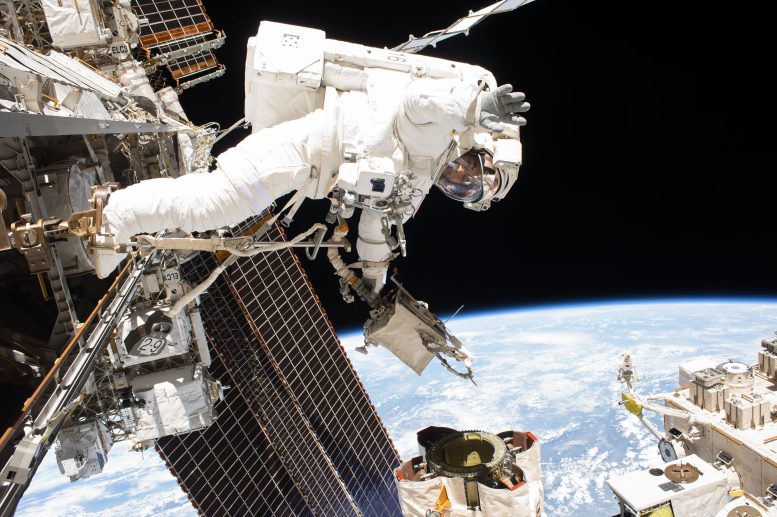
NASA astronaut and Expedition 53 Flight Engineer Mark Vande Hei is pictured during a spacewalk to service components on the Canadarm2 robotic arm during a spacewalk with NASA astronaut Randy Bresnik (out of frame). (October 10, 2017) Credit: NASA
For one investigation, Vande Hei helped grow and evaluate vegetables harvested with the space station’s Vegetable Production System, or Veggie. The investigation seeks to develop a food production system that can help astronauts meet their dietary needs with fresh vegetables cultivated in space.
Vande Hei also provided biological samples for an investigation that collects a core set of measurements, called Spaceflight Standard Measures. The investigation seeks to characterize “normal” changes in the human body during spaceflight. For instance, wrist-worn sensors that measure activity levels and light exposure can help researchers better understand the sleep-wake cycle of astronauts. Blood and saliva samples collected by crew members throughout their mission can also help scientists assess changes in various hormones, proteins, and cells that reveal how the immune system changes in space.
In addition, he contributed to a separate investigation collecting biological samples from the crew aboard the space station and placing them in a storage bank. Researchers can draw upon the samples to study spaceflight-induced changes in human physiology.
Vande Hei also participated in the first formal investigation into how eating repetitive meals in spaceflight changes the appeal of certain foods over time. In space, menu fatigue can have serious consequences, including lost appetites, nutritional deficiencies, and loss of body mass. Results will help researchers improve the design of current and future space food systems.
He is also the first astronaut on an extended mission to help researchers investigate whether an enhanced spaceflight diet can allow humans to better adapt to space. Scientists seek answers to questions such as: Could a diet packed with foods rich in nutrients such as flavonoids, lycopene, and omega-3 fatty acids boost immunity and gut microbe function on long journeys into space?
After he lands, Vande Hei will provide additional feedback to researchers investigating potential injuries such as bruises incurred by astronauts from the force of landing. This feedback will help scientists better understand whether long-term human spaceflight makes crew members more susceptible to such injuries. Results will also help NASA design protective measures in future spacecraft.
Vande Hei’s contributions will expand NASA’s knowledge about how the human body adapts to long-term spaceflight as the agency plans for future missions to the Moon and Mars. Until then, taking time to relax and read will help him balance out the rigors of space travel.
NASA’s Human Research Program, or HRP, pursues the best methods and technologies to support safe, productive human space travel. Through science conducted in laboratories, ground-based analogs, and the International Space Station, HRP scrutinizes how spaceflight affects human bodies and behaviors. Such research drives HRP’s quest to innovate ways that keep astronauts healthy and mission-ready as space travel expands to the Moon, Mars, and beyond.
